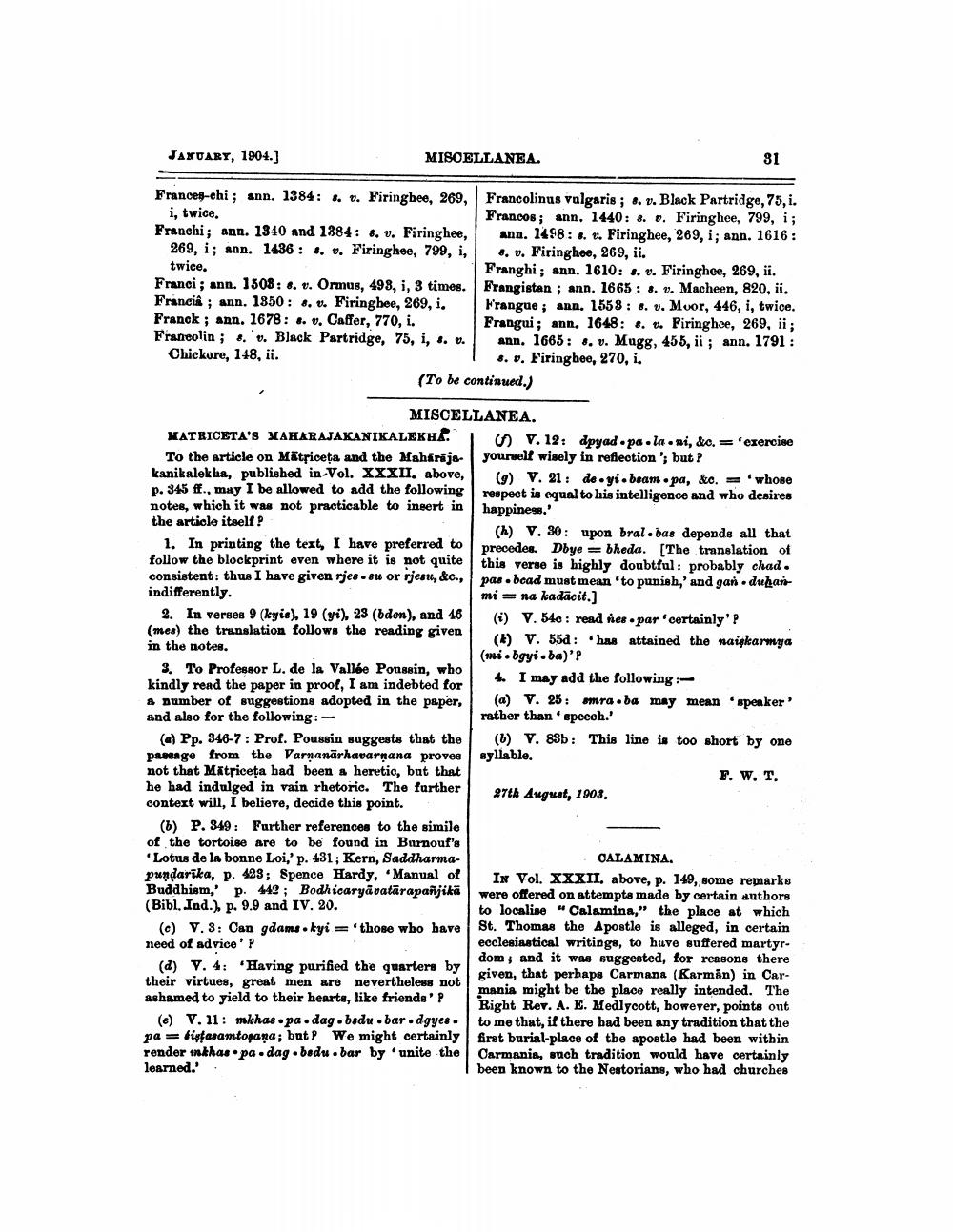________________
JANUARY, 1904.]
MISCELLANEA.
31
Frances-chi ; ann. 1384: . v. Firinghee, 269, Francolinus vulgaris ; 6. v. Black Partridge, 75, i. i, twice.
Francos; ann, 1440: 8. o. Firinghee, 799, i; Franchi; ann. 1340 and 1384 : 8. v. Firinghee, Ann. 1498: 8. v. Firinghee, 269, i; ann. 1616:
269, i ; ann. 1436 : . . Firinghee, 799, i, 8. v. Firinghee, 269, ii. twice.
Franghi ; ann. 1610: «. v. Firinghoe, 269, ii. Franci; ann. 1508: 6. r. Ormus, 493, i, 3 times. Frangistan ; ann. 1665 : 8. v. Macheen, 820, ii. Franciâ ; ann. 1850 : 8, t. Firingbee, 269, i. Frangue ; ann. 1558 : 8. v. Muor, 446, i, twice. Franck; ann. 1678: 8. v. Caffer, 770, i. Frangui; ann. 1648: 6. t. Firinghae, 269, ii; Francolin ; .'. Black Partridge, 75, i, .. u. ann. 1665: 8. v. Mugg, 455, ii ; ann. 1791: Chickore, 148, ii.
8. v. Firinghee, 270, i. (To be continued.)
MISCELLANEA. MATRICETA'S MAHARAJAKANIKALEKHR.
V. 12: dpyad .pa .la.ni, &c. ='exercise To the article on Mātriceta and the Mahirija- yourself wisely in reflection', but ? kanikalekha, published in Vol. XXXII, above,
(9) V. 21 : de.yi.bsam pa, &c. = 'whose p. 345 ff., may I be allowed to add the following
respect is equal to his intelligence and who desires notes, which it was not practicable to insert in happiness, the article itself?
(h) V. 30: upon bral.bas depends all that 1. In printing the text, I have preferred to precedes. Dbye bheda. [The translation of follow the blockprint even where it is not quite
this verse is highly doubtful: probably chad. consistent: thus I have given rjes . ou or rjest, &c., pas. bead must mean to punish,' and gan . dubair indifferently.
mi = na kadacit.) 2. In verses 9 (kyis), 19 (yi), 23 (bden), and 46 (1) V. 540 : read nes. par certainly's (mes) the translation follows the reading given
(1) V. 55d: has attained the naiykarmya in the notes.
(mi.bgyi.ba)'? 3. To Professor L. de la Vallée Poussin, who
4. I may add the following: kindly read the paper in proot, I am indebted for a number of suggestions adopted in the paper, (a) V. 25: emra.ba may mean speaker and also for the following: -
rather than speech.' (a) Pp. 346-7: Prof. Poussin suggests that the (6) V. 83b: This line is too short by on pasonge from the Varnanärhavarnana proves syllable. not that Matsioeta bad been a heretic, but that
F. W.T. he had indulged in vain rhetoric. The further
97th August, 1903. context will, I believe, decide this point.
(6) P. 349: Further references to the simile of the tortoise are to be found in Burnout's Lotus de la bonne Loi,' p. 431; Kern, Saddharma
CALAMINA. pundarika, p. 423; Spence Hardy, Manual of IN Vol. XXXII. above, p. 149, some remarks Buddhism, p. 442; Bodhicaryāvatārapañjikä were offered on attempts made by certain authors (Bibl. Ind.), p. 9.9 and IV. 20.
to localise - Calamina," the place at which (c) V.3: Can gdamskyi = 'those who have
St. Thomas the Apostle is alleged, in certain need of advice'?
ecclesiastical writings, to huve suffered martyr.
dom; and it was suggested, for reasons there (d) V. 4: Having purified the quarters by
given, that perhaps Carmana (Karman) in Cartheir virtues, great men are nevertheless not
manis might be the place really intended. The ashamed to yield to their hearts, like friends'
Right Rev. A. E. Medlycott, however, points ont (6) V. 11: mkhas.pa. dag.bodu .bar .dgyes to me that, if there had been any tradition that the pa =bigtasamtopana; but P We might certainly first burial-place of the apostle had been within render khas. pa. dag bsdu.bar by 'unite the Carmania, such tradition would have certainly learned.'
I been known to the Nestorians, who had churches




